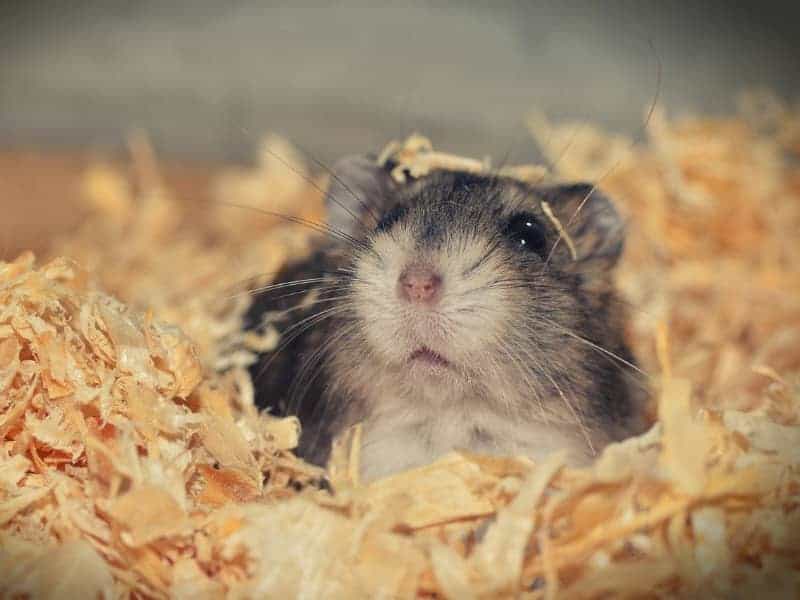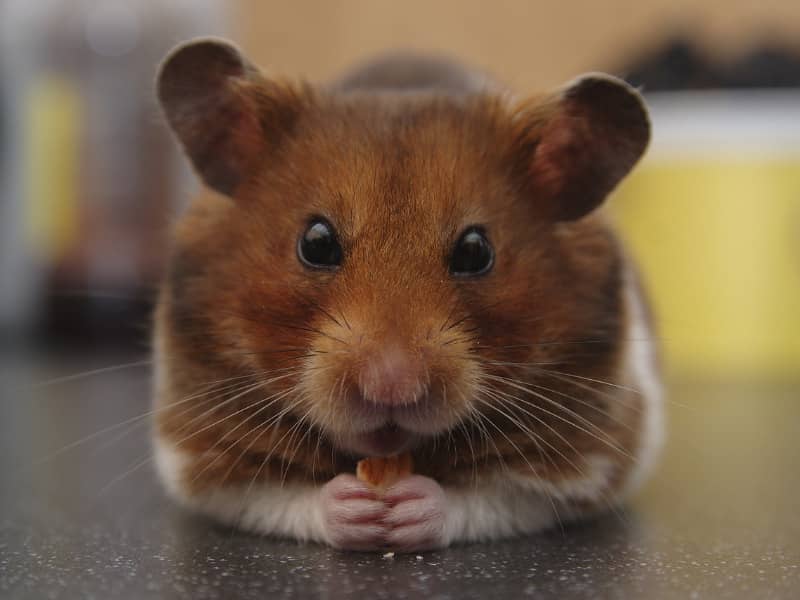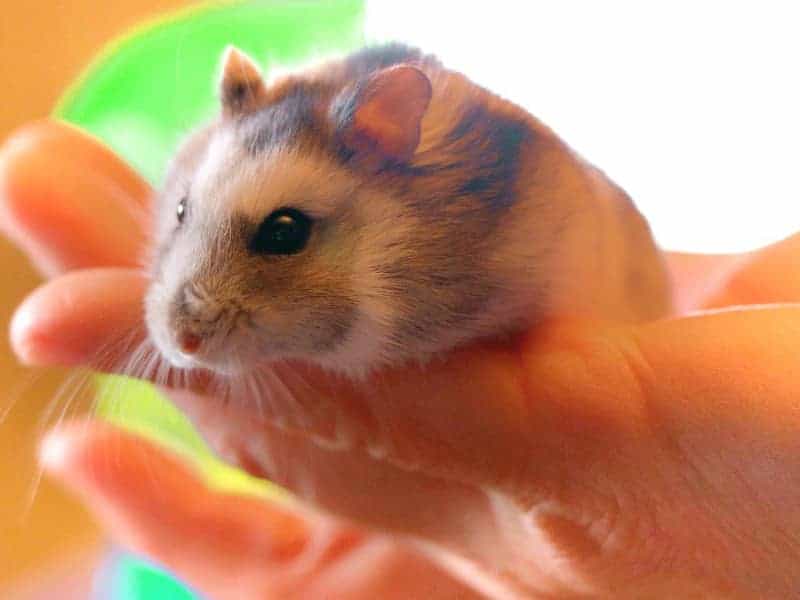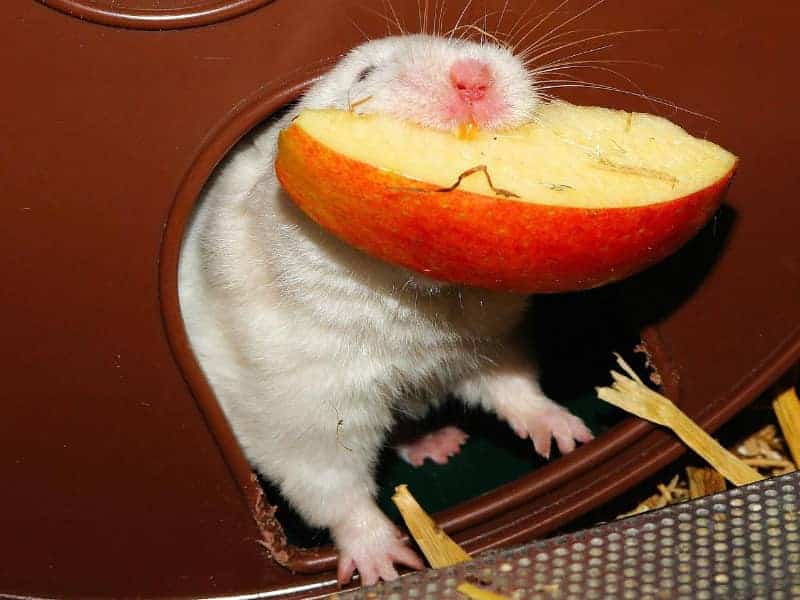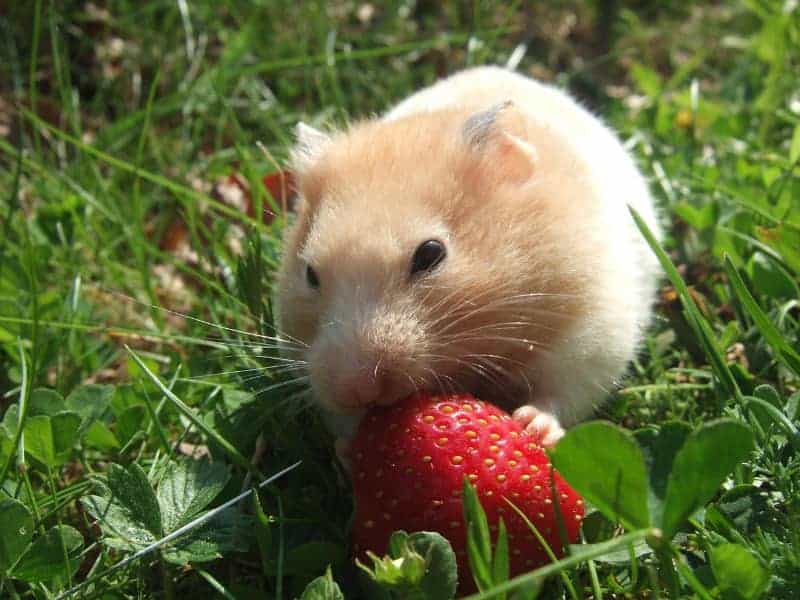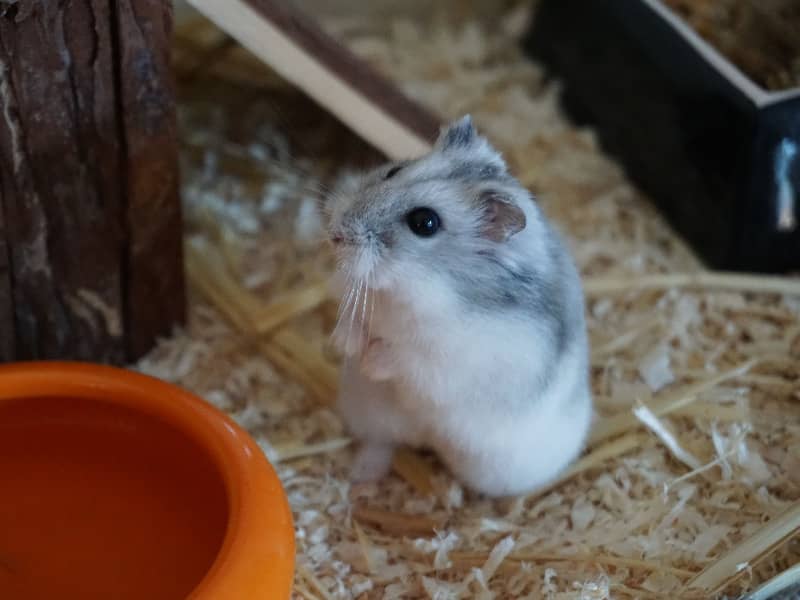
Do hamsters stink?
So you've noticed that your hamster stinks and doesn't exactly smell of roses? Don't worry, you're not alone. Many hamster owners ask themselves why their little friend smells unpleasant. In this article, we get to the bottom of the causes of the smell.
Do hamsters stink because of their food and diet?
Diet plays a crucial role when it comes to your hamster's odor. Some foods can produce gases or excretions that smell unpleasant. For example, protein-rich foods such as meat or certain vegetables such as cabbage can lead to a stronger odor.
Another factor is the quality of the food. Cheap food often contains fillers and artificial ingredients that are not only unhealthy for your hamster, but can also lead to unpleasant odors. It is therefore advisable to choose high-quality food that has been specially developed for hamsters.
Also make sure that you don't leave any food rotting in the cage. A forgotten piece of fruit or vegetable can quickly become moldy and cause an unpleasant smell. It is therefore important to check the cage regularly and remove any leftover food.
Hygiene and cage cleaning
A clean cage is the be-all and end-all when it comes to avoiding unpleasant odors. Unfortunately, many hamster owners neglect this aspect and then wonder why their hamster stinks. Hamsters are naturally clean animals and need a clean environment to feel comfortable.
Cleaning should be carried out at least once a week, whereby the entire cage should be cleaned and the bedding replaced. The food and water bowls should also be cleaned regularly to prevent the build-up of bacteria and associated odors. Another tip is to use a small scoop or tweezers to remove droppings and other waste daily.
Health problems
Sometimes the unpleasant odor can also be a sign of health problems. If you notice that your hamster smells unpleasant despite regular cleaning and a balanced diet, you should consult a vet. Possible causes could be infections, skin problems or digestive disorders.
A vet can make an accurate diagnosis and initiate the appropriate treatment. It's better to play it safe than to ignore health problems that could be responsible not only for unpleasant odors, but also for your hamster's well-being.
Hamster stinks - How to combat the odor effectively
You now know why your hamster may smell unpleasant. But what can you do about it? In this section, we give you practical tips to combat the odor effectively.
Choosing the right bedding
Choosing the right bedding is crucial for odor control. There are different types of bedding, including wood shavings, paper and even special products advertised with odor control. However, not all types of bedding are equally effective when it comes to absorbing odors.
Wood shavings, especially those made from cedar or pine, can be inexpensive, but they are not always the best choice. Some types of wood can even be harmful to hamsters and cause skin or respiratory problems. Paper-based bedding is a better option as it is more absorbent and creates less dust.
Special types of bedding designed for odor control can also be a good choice. These products often contain natural ingredients such as activated charcoal that effectively absorb odors. However, it is important to check the ingredients carefully to make sure they are safe for your hamster.
Cleaning tips for the cage
Regular cleaning of the cage is essential to avoid unpleasant odors. But what is the best way to clean the cage? First of all, you should remove all toys, bowls and other objects from the cage.
Use a special cage cleaner or a mild soap solution to clean the cage thoroughly. Avoid aggressive cleaning agents as these can irritate your hamster's respiratory tract. After cleaning, the cage should be allowed to dry completely before new bedding and items are put back in.
Frequency of cleaning
How often you should clean the cage depends on various factors, including the size of the cage, the number of hamsters and the bedding used. A small cage with several hamsters naturally requires more frequent cleaning than a large cage with just one hamster.
As a general rule, a complete cleaning should be carried out at least once a week. In addition, it is advisable to remove droppings and food residues daily to minimize the accumulation of odours.
Hamster stinks - The diet
You've cleaned your cage and chosen the right bedding, but the smell remains? Then your hamster's diet could be the key to solving the problem. In this section, we'll look at which foods encourage odors and which are a better choice.
Which foods promote unpleasant odors?
There are certain foods that can lead to unpleasant odors in hamsters. Protein-rich foods such as meat or fish can intensify the smell of hamster droppings. Certain vegetables such as cabbage, broccoli or cauliflower can also have a flatulent effect and thus cause unpleasant odors.
It is important to feed these foods in moderation and not to make them the main source of nutrition. Instead, you should offer a balanced diet with a mixture of vegetables, fruit and special hamster food.
Nutrition tips for a less smelly hamster
If you want to minimize your hamster's smell, there are a few dietary tips you can follow. Firstly, you should offer fresh fruit and vegetables that are rich in water. Watermelon, cucumber or apple are good examples. These foods help to cleanse the digestive tract and can reduce the smell of feces and urine.
It is also advisable to use special hamster food that contains all the necessary nutrients. Avoid cheap food with lots of fillers and artificial additives, as these can make the odor worse.
It is also important to keep the food portions appropriate. Overfeeding can not only lead to obesity, but also to digestive problems and unpleasant odors.
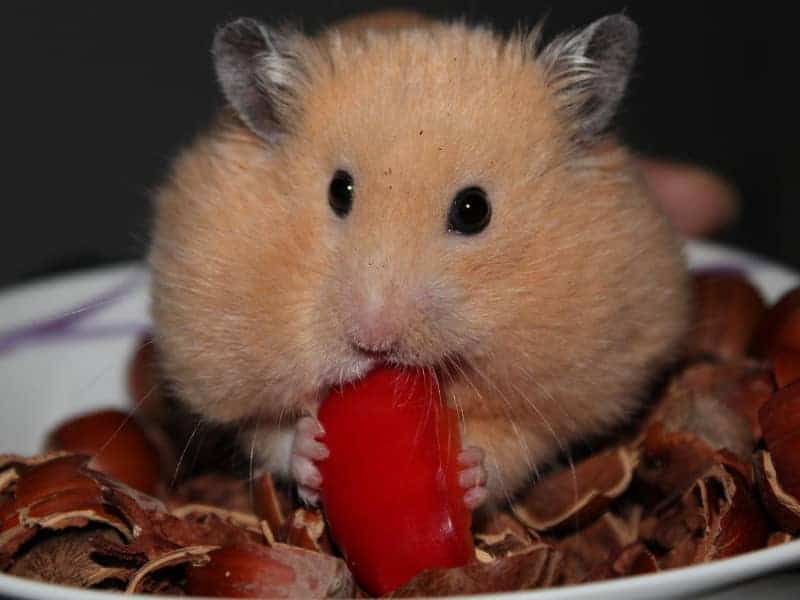
Hamster stinks - Health aspects
Sometimes your hamster's unpleasant odor is not a result of poor hygiene or diet, but a sign of health problems. In this section you will find out which diseases can lead to a bad smell, when a visit to the vet is advisable and how you can take preventative action.
Diseases that can lead to bad odor
An unpleasant odor can be a symptom of various health problems. Infections in the digestive tract, skin problems or even tumors can lead to a noticeable odor. Dental problems can also be the cause of bad breath.
It is important to take such symptoms seriously and not ignore them. A persistent, unexplained odor can signal a serious health problem that requires immediate treatment.
When you should see a vet
If you notice that your hamster continues to smell unpleasant despite your best efforts, it's time for a visit to the vet. This is especially true if the smell appears suddenly or is accompanied by other symptoms such as lethargy, loss of appetite or changes in behavior.
A vet can make an accurate diagnosis and initiate the appropriate treatment. It's better to play it safe than to ignore health problems that could be responsible not only for unpleasant odors, but also for your hamster's well-being.
Preventive measures
Prevention is always better than cure. There are some measures you can take to avoid health problems that could lead to bad odor. These include a balanced diet, regular cage cleaning and sufficient exercise for your hamster.
It is also advisable to schedule regular visits to the vet for preventative care. A vet can recognize early signs of health problems and recommend appropriate measures.
Conclusion: Do hamsters stink?
An unpleasant odor in your hamster can have various causes. It is important to systematically identify these causes and act accordingly. From choosing the right bedding and carefully cleaning the cage to checking the diet and possible health problems, there are many factors that need to be considered.
The good news is that most odor problems can be resolved with a few simple changes to your hamster's care and diet. However, if the odor persists or is accompanied by other symptoms, a visit to the vet is essential to rule out serious health problems.
In any case, it's important to be proactive and always keep an eye on your little friend's well-being. A happy hamster is usually also a less smelly hamster!
FAQ on the subject of "stinky hamsters"
Why does my hamster smell unpleasant?
There are various reasons why a hamster can smell unpleasant. These include diet, poor cage hygiene and health problems. It is important to identify the exact cause in order to combat the odor effectively.
How often should I clean the cage?
The frequency of cage cleaning depends on various factors, such as the size of the cage and the number of hamsters. However, as a general rule, a complete cleaning should be carried out at least once a week.
Which bedding is best for odor control?
Paper-based bedding or special types of bedding designed for odor control are often the best choice. Avoid wood shavings made from cedar or pine, as these can be harmful to hamsters.
Which foods should I avoid to minimize the smell?
Protein-rich foods such as meat and certain vegetables such as cabbage can lead to unpleasant odors. It is better to offer a balanced diet of fruit, vegetables and special hamster food.
When should I see a vet?
If the unpleasant odor persists despite all efforts or is accompanied by other symptoms such as lethargy or loss of appetite, you should consult a vet.
Are there preventive measures against unpleasant odors?
Yes, a balanced diet, regular cage cleaning and sufficient exercise can help to prevent unpleasant odors. Regular visits to the vet for preventative care are also recommended.
Author

-
Garden animal - A life with nature
Welcome to my animal blog! My name is Dirk and I am happy to take you on my journey through the fascinating world of animals and gardening.
Born 54 years ago, I have had an insatiable curiosity for the animal world around me since childhood. Although I have moved professionally in other industries, my true passion has always been animals and nature. It is remarkable how a small garden has become such an important part of my life.
Many of my fondest memories are associated with the animals that share our home. Whether it's the curious squirrels that scurry across the trees in the morning, the colorful variety of birds that visit our feeders, or the busy bees and butterflies that pollinate our flowers, every moment with them is invaluable to me.
This blog is my contribution to share my experiences, discoveries and insights with like-minded people. Here I will share stories of unforgettable encounters with animals, give tips on gardening and creating wildlife-friendly habitats, and take you on my journeys through nature.
Thank you so much for being here!
Cordial,
Dirk aka garden animal
Last posts
- 27. February 2024PetsVeganes Hundefutter – Grün und Gesund?
- 18. January 2024ChickensOregano für Hühner
- November 27, 2023HamsterDiurnal hamsters
- November 24, 2023HamsterHamster hammock

